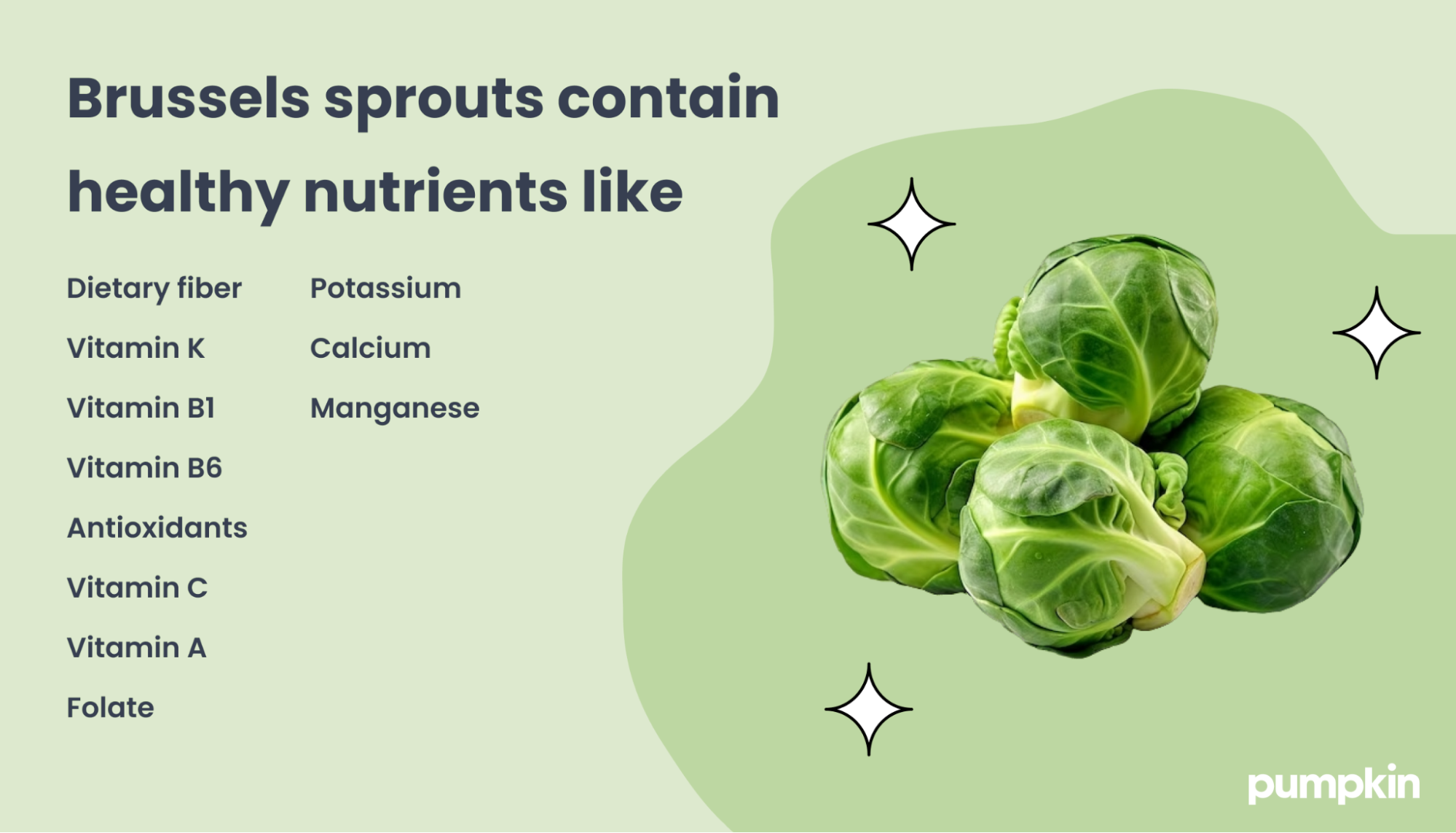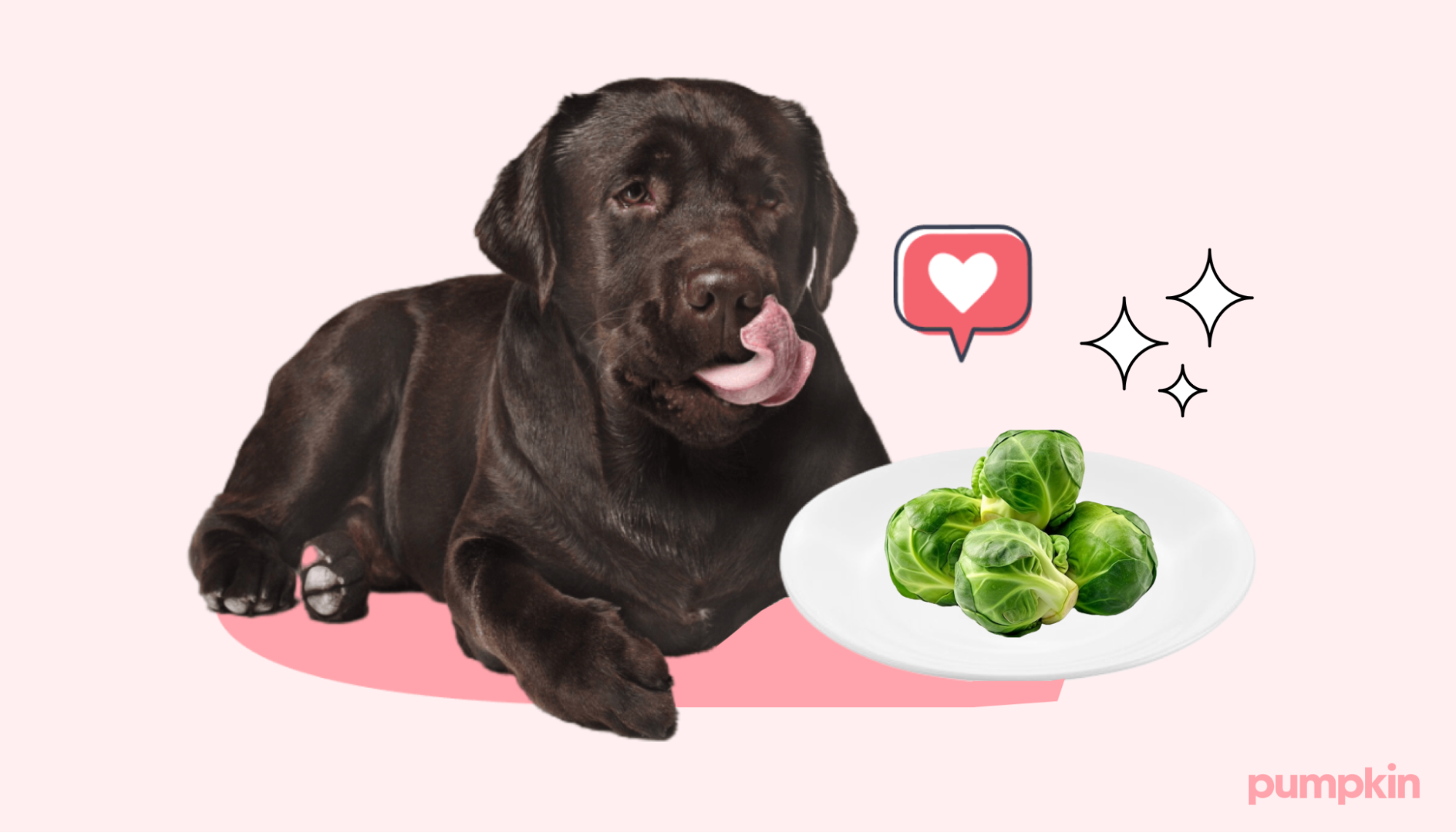- Lynn Guthrie
- Oct 1, 2024
- 6 min read
Key Points:
Yes, dogs can eat Brussels sprouts, but they should be cooked and served in moderation.
Brussels sprouts are rich in vitamins K, A, and C and beneficial for dogs.
Some dogs may not like the bitter taste of Brussels sprouts.
Never feed your dog raw Brussels sprouts as they can cause digestive issues.
Brussels sprouts — those curious little cabbages our grandmothers served at holiday meals — are packed with essential vitamins, minerals, and fiber. They’re good for you, and they can be good for your dog, too, assuming they enjoy the taste of this divisive vegetable. Because even though dogs can eat Brussels sprouts, that doesn't mean they will.
As long as they’re prepared correctly — and as long as your dog likes the taste — these veggies are safe for dogs. Let’s look at what makes Brussels sprouts an excellent snack option for your dog.
Meet the Brussels sprout
The Brussels sprout is a cruciferous plant and part of the Brassica genus of plants. While people often say “brussel sprout,” the proper term is always Brussels sprout.
“Cruciferous” means cross-bearing, a reference to the four petals on the plants’ flowers. This family of plants is also known as the mustard plant family, with cousins including broccoli, kale, arugula, cabbage, radishes, and watercress.
Low in calories and carbohydrates but high in fiber, Brussels sprouts contain 28 calories and two grams of fiber in a half-cup serving. This makes them an ideal treat for all dogs, including those who have diabetes or weight problems.
Health benefits of Brussels sprouts
Brussels sprouts are packed with nutrition for both humans and pups. This veggie contains plenty of fiber, vitamins, and minerals to promote healthy digestion and strong muscles and bones.
Here are some of the key nutrients that Brussels sprouts provide your pup:

Dietary fiber: Fiber keeps your dog’s digestive system healthy. Fiber contributes to healthy bowel movements, reducing the incidence of stomach issues, constipation, and diarrhea. It also sustains a feeling of fullness after meals, which reduces begging behavior. Brussels sprouts are also a great snack for healthy weight management in dogs.
Vitamin K: This fat-soluble vitamin helps regulate blood calcium levels, which reduces the risk of heart disease and aids in blood circulation.
Vitamins B1 and B6: These important vitamins boost your dog’s metabolism by helping release energy from foods. They also help in making new cells and support your dog’s nervous system.
Antioxidants: Brussels sprouts are high in antioxidants, which provide anti-inflammatory properties, boost your dog’s immune system, and reduce the risk of some cancers and heart disease. Well-known antioxidants found in Brussels sprouts include vitamin C, vitamin A, and folate.
Potassium, calcium, and manganese: These essential minerals support your dog’s bone health, cell function, nervous system, and muscle function.
With all these benefits, you might think there’s not much of a downside to Brussels sprouts. But there are a few risks and side effects you’ll want to know about before you offer these crunchy veggies to your dog — and we're not just talking about dog farts.
The downsides of Brussels sprouts for dogs
If you don't prepare or serve these veggies correctly, they do pose some risks.
Beware isothiocyanates
Cruciferous vegetables like broccoli and Brussels sprouts contain isothiocyanates. These hard-to-pronounce molecules can also be hard on the canine digestive system. In small amounts, isothiocyanates are beneficial because they help intestinal muscles push food and waste through the digestive tract. But they also build excess bacteria and create a lot of gas, which can be uncomfortable for your pooch. If your dog eats too many sprouts, you may have to open the windows to rid the house of stinky dog farts.
Raw Brussels spouts are hard to digest
Your dog’s digestive system will have a hard time processing the fiber in raw sprouts. This could cause gastrointestinal upset, bloating, or diarrhea.
Not only are raw Brussels sprouts hard to digest, but the stalks are also very fibrous and tough. They can present a choking hazard for your dog and cause intestinal blockages or impaction problems. However, if you peel the outer skin off the stalk, then it’s relatively safe for your dog to eat after cooking. The leaves are also okay if they’re chopped and cooked.
Allergies
There’s one more concern with giving Brussels sprouts to dogs: allergies. Dogs can have an allergic reaction to human foods, including Brussels sprouts. Watch for signs of a food allergy in your dog such as excessive itching, vomiting, diarrhea, skin rashes, or sneezing.
Allergic reactions are rare, but being a pet parent is a journey that’s full of surprises. A pet insurance plan can help you afford the costs of surprise vet visits in the event of a future emergency or unexpected illness.
So, with all these health benefits and precautions noted, how should you offer this tasty vegetable to your dog? Let’s look at that now.
How to serve Brussels sprouts to your dog

The amount of Brussels sprouts your dog can eat depends on their size. In general, a couple of sprouts chopped into small pieces is more than enough for most dogs. Small dogs require fewer daily calories than larger dogs, so tailor the serving based on your pup's weight When in doubt, check with your vet for the correct serving size to avoid giving them stinky sprout gas.
When feeding your dog any food besides their regular dog food, follow the 90/10 rule: 90% of your dog’s calories should come from balanced dog food, with the remaining 10% coming from healthy treats. Because they contain isothiocyanates, 10% of their diet would be too large a serving for this veggie.
How to prepare Brussels sprouts for dogs
When choosing Brussels sprouts, pick green sprouts — organic if possible — with no wilted or brown leaves. (Old sprouts can cause watery stools.) Cut off the stem and wash your Brussels sprouts to remove any pesticides or chemicals that could upset your dog’s stomach.
Steamed, boiled, or microwaved Brussels sprouts are the easiest to digest. Steaming is the best way to preserve your sprouts’ nutritional value and antioxidant properties. Boiling them is the worst because the nutrients will leech out into the water, leaving the Brussels sprouts without all of their nutritional benefits. Any added seasonings or oils will give your dog an upset stomach or worse. As tasty as onions, garlic, and salt are to humans, they’re toxic to your dog. Excess oil or butter can also wreak havoc on your dog’s digestive health, so give your dog cooked, unseasoned Brussels sprouts.
Lastly, frozen Brussels sprouts may cause a choking hazard since many dogs gulp their food. It’s best to stick to offering cooked Brussels sprouts only.
Snack alternatives to Brussels sprouts for dogs
If you just can’t handle the stinky aftermath of giving your dog Brussels sprouts, there are other healthy snack options that pack a nutritional punch for your pooch. Give these high-fiber treats a try and see which one is your pup’s new favorite:
Should your dog eat Brussels sprouts?
Brussels sprouts are healthy, low-calorie treats that many dogs love. As long as you’re serving your dog plain, fresh, and cooked sprouts, they’re a tasty addition to your dog’s dinner bowl (or an excellent quick snack). Overweight or diabetic dogs can even benefit from these cruciferous vegetables — as long as you prepare them properly and offer them in moderation. If you give your dog too many sprouts, don't be surprised when they start passing gas.
FAQs
Can puppies eat Brussels sprouts?
Puppies can eat Brussels sprouts too, but the portion size should be extra small. Brussels sprouts should also be cooked before sharing with your puppy. Make sure to monitor them for any adverse reactions after eating.
Can dogs eat Brussels sprouts raw?
No, dogs shouldn’t eat raw Brussels sprouts as this veggie can be too tough for their stomachs and intestines to digest. If your dog has eaten a raw sprout, watch them for gastrointestinal issues like stomach upset, excessive gas and bloating, and too frequent or infrequent pooping. For the sake of your sanity and their stomach, it’s better to cook them first.
Can dogs eat Brussels sprouts stalks?
Brussels sprout stalks are not safe for dogs to eat because they’re too tough and fibrous, which makes chewing and digestion difficult for dogs. Brussels sprouts themselves are good for dogs, just make sure to wash and cook them first.
REFERENCES
https://nutritionsource.hsph.harvard.edu/food-features/brussels-sprouts/
https://stephenscountyhospital.com/the-beginners-guide-to-cruciferous-vegetables
https://www.healthline.com/nutrition/benefits-of-brussels-sprouts
https://www.akc.org/expert-advice/nutrition/vitamins-dogs-need-healthy-lifestyle/
https://www.petmd.com/dog/nutrition/evr_dg_whats_in_a_balanced_dog_food#
https://www.akc.org/expert-advice/nutrition/how-many-treats-can-dog-have/

